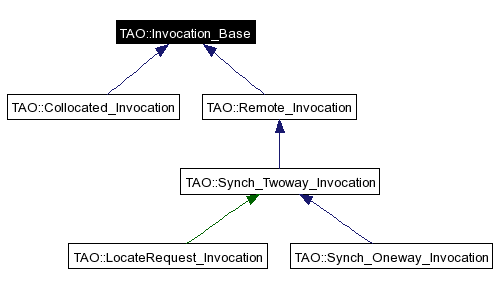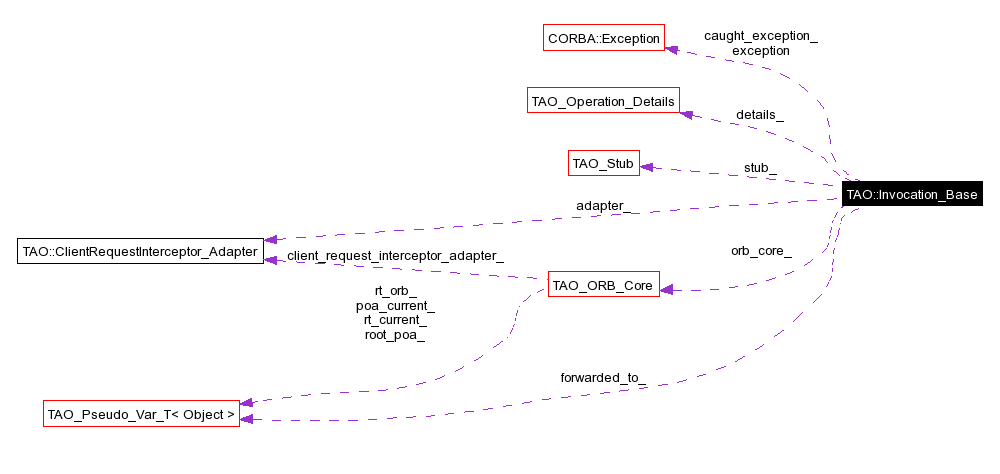
#include <Invocation_Base.h>
Inheritance diagram for TAO::Invocation_Base:


[NOHEADER] | |
| size_t & | stack_size (void) |
| CORBA::Exception * | caught_exception (void) |
| TAO::Invocation_Status | invoke_status (void) const |
| Invoke status. | |
| PortableInterceptor::ReplyStatus | reply_status (void) const |
| bool | is_remote_request () const |
| void exception CORBA::Exception * | exception |
| Change the exception status. | |
| Invocation_Status | send_request_interception () throw (CORBA::SystemException) |
| Invocation_Status | receive_reply_interception () throw (CORBA::SystemException) |
| Invocation_Status | receive_other_interception () throw (CORBA::SystemException) |
| PortableInterceptor::ReplyStatus | handle_any_exception (CORBA::Exception *e) |
| PortableInterceptor::ReplyStatus | handle_all_exception () |
| ClientRequestInterceptor_Adapter * | adapter_ |
| The client requestor adapter. | |
| size_t | stack_size_ |
| TAO::Invocation_Status | invoke_status_ |
| CORBA::Exception * | caught_exception_ |
| Pointer to the caught exception. | |
| bool | is_remote_request_ |
Public Member Functions | |
| virtual | ~Invocation_Base (void) |
| TAO_ORB_Core * | orb_core (void) const |
| TAO_Stub * | stub (void) const |
| CORBA::Object_ptr | forwarded_reference (void) |
| void | forwarded_reference (CORBA::Object_ptr o) |
| TAO_Service_Context & | request_service_context (void) |
| Accessors for the service context list. | |
| TAO_Service_Context & | reply_service_context (void) |
| CORBA::Object_ptr | steal_forwarded_reference (void) |
| Return the forwarded object location by loosing ownership. | |
| bool | is_forwarded (void) const |
| Did the invocation got forwarded to a new location? | |
| void | reply_received (Invocation_Status s) |
| Mutator to set the reply status of the invocation. | |
| CORBA::Object_ptr | effective_target (void) const |
| Return the effective target of the invocation. | |
| CORBA::Object_ptr | target (void) const |
| Return the target object. | |
| CORBA::Boolean | response_expected (void) const |
| Does this invocation return a response? | |
| TAO_Operation_Details & | operation_details (void) |
| The operaton details of the invocation. | |
Protected Member Functions | |
| Invocation_Base (CORBA::Object_ptr otarget, CORBA::Object_ptr target, TAO_Stub *stub, TAO_Operation_Details &op, bool response_expected, bool request_is_remote) | |
Protected Attributes | |
| TAO_Operation_Details & | details_ |
| The operation details on which we are operating on. | |
| CORBA::Object_var | forwarded_to_ |
| Forwarded object reference. | |
| bool | response_expected_ |
| Is response expected? | |
Private Member Functions | |
| Invocation_Base (const Invocation_Base &) | |
| Invocation_Base & | operator= (const Invocation_Base &) |
Private Attributes | |
| CORBA::Object_ptr | otarget_ |
| The original target on which the invocation was started. | |
| CORBA::Object_ptr | target_ |
| The effective target on which the invocation is on. | |
| TAO_ORB_Core * | orb_core_ |
| Cache the ORB_Core. | |
| TAO_Stub * | stub_ |
| The original target on which the invocation was started. | |
This class is the base of the invocation object hiererachy. This hierarchy is classified based on the type of invocation and the mode of invocation. One of the objects from the hierarchy is created on the stack for every invocation.
In addition this class encapsulates the essential details that are required for PortableInterceptors to function correctly. Further this class also provides some helper and accessor methods that are used by clients.
|
|
|
|
||||||||||||||||||||||||||||
|
|
|
|
|
|
|
|
|
|
Return the effective target of the invocation. Please see the PortableInterceptor specification in the CORBA spec to understand what effective target means. |
|
|
|
|
|
These access methods have to be public so that the PortableInterceptor can use them |
|
|
|
|
|
Helper methods to handle interception calls when exceptions are thrown by the PortableInterceptor. |
|
|
Invoke status.
|
|
|
Did the invocation got forwarded to a new location?
|
|
|
Accessor used to determine if the current invocation is part of a remote request, and if not, it will be considered to be part of a collocated request. |
|
|
The operaton details of the invocation.
|
|
|
|
|
|
|
|
|
Helper method to invoke receive_other interception call to all the registered interceptors. |
|
|
Helper method to invoke receive_reply interception call to all the registered interceptors. |
|
|
Mutator to set the reply status of the invocation.
|
|
|
|
|
|
|
|
|
Accessors for the service context list. The service context lists are actually cached elsewhere. Providing this accessor helps the PI to access this list in both remote and collocated mode. |
|
|
Does this invocation return a response?
|
|
|
Helper method to invoke send_request interception call to all the registered interceptors. |
|
|
|
|
|
Return the forwarded object location by loosing ownership.
|
|
|
|
|
|
Return the target object.
|
|
|
The client requestor adapter.
|
|
|
Pointer to the caught exception.
|
|
|
The operation details on which we are operating on.
|
|
|
Change the exception status.
|
|
|
Forwarded object reference.
|
|
|
|
|
|
Flag used to distinguish a remote invocation versus a collocated (thru-poa) invocation. |
|
|
Cache the ORB_Core.
|
|
|
The original target on which the invocation was started. The following object reference pointers are *not* duplicated. They are cached for portable interceptors, and they just live for the lifetime of the request. Hence there is no point in duplicating the pointers. |
|
|
Is response expected?
|
|
|
|
|
|
The original target on which the invocation was started. The following object reference pointers are *not* duplicated. They are cached for portable interceptors, and they just live for the lifetime of the request. Hence there is no point in duplicating the pointers. |
|
|
The effective target on which the invocation is on.
|
 1.3.9.1
1.3.9.1